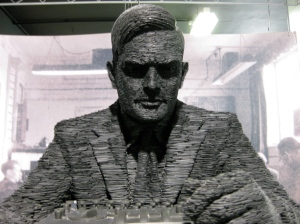
The Mansion at Bletchley Park
Since we’re moving to Geneva, we are keen to visit a few places in the UK before we go. It’s not like the UK is a million miles away, but we realise that there’s Europe to explore and so we do not intend to come back for anything other than to visit parents and so on.
One of the places we wanted to visit was Bletchley Park, of ‘Enigma’ fame and home of the Codebreakers and perhaps less well known but also of significance, The National Computer Museum.
There is a deep incongruity between the importance of the site and its contents and the attention it receives from funding. Despite valiant attempts, including the work of several volunteers, no one can fail to see how run down parts of the grounds are, how the exhibits are poorly organised and how it compares unfavourably to other modern museums in its approach (cf Duxford Air Museum, the subject of a future post). You can sign a petition here to save Bletchley Park from what the site calls its ‘two to three more years of survival’. I hope it survives and the exhibits given the context they deserve; you would, too, if you visited.

The grounds include a pond with water jet
If you can forget all this for a moment – and this is easily done, since the Bletchley Park story is so interesting and important – the site soon becomes wonderfully alive, and full of treasures. The working of the code-breaking machines is relatively complex (for me, at least) but the museum is careful to relate it to a human endeavour, and we are continually reminded of the heroism and sheer hard work both en masse and by individuals. And the fun, too: in a collection of reminisces, one woman, Diana Russel Clarke, remembers:
We had a very gay time going out to pubs for supper together when we were free. A lot of romance went on, definitely a lot of romance.
Those better known are represented, too. The slate bust of Alan Turing, the eccentric and troubled genius behind the code breaking, looms large in its room as does his presence throughout the grounds and buildings.

The slate bust of Alan Turing
Near the cinema – which plays authentic newsreels the kind of which you’ve caught briefly in documentaries – is a wonderful room full of photographic equipment. It’s oddities like this that really make Bletchley Park a rich and varied experience, unpredictable and quirky like, if our apocryphal stories are to be believed, like the very men and women that helped crack those codes at Station X. Note men and women: Bletchley Park should be lauded for its gender equality, devoting a great deal of time and space to the heroines of the war, in service and at home.
The National Computer Museum seems more a labour of love than a fully functioning museum but it’s no less interesting for it. If you’ve been using computers for a while you’ll be delighted at seeing those you recognise, some of which are still working. I wonder if, when using some virtual computer in years to come, I might be reminded of the Apple Mac IIc and remark: ‘they don’t make them like they used to’.

Copyright 1982 Sinclair Research Limited
Whilst walking through the grounds, I had a big debate with Jennie regarding the genuine prospect of a German invasion and the role propaganda had in controlling the British peoples’ attitude to the war. The details aren’t important. What is important is that Bletchley Park survives, and along with it the kinds of conversations, emotions and thinking it inspires.

http://www.independent.co.uk/news/uk/this-britain/bletchley-a-national-disgrace-902893.html
@Keri
Thanks for the link, Keri. I wonder if it’s because we do not value intellectuals here in quite the same way we do elsewhere? After all, Bletchley Park is ultimately about thinking your through a war: and I’m glad to find the museum not turned over to a more militarily heroic version (there were enough real heroes; and besides, the Americans tried that with the infamous U-571).
We’ve got Nelson’s Column for the Battle at Trafalgar; but I can’t imagine thousands of people paying their respects to one of our intellectuals like they did in France when Jean-Paul Sartre died.